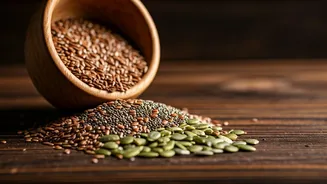Seeds for Heart Health
Seeds are a powerhouse of nutrients, and their contribution to heart health is remarkable. Many seeds contain soluble fiber, which helps bind to cholesterol
in the digestive system, preventing its absorption into the bloodstream. This process helps to reduce levels of LDL (bad) cholesterol. Furthermore, seeds are packed with omega-3 fatty acids, which have anti-inflammatory properties, reducing the risk of heart disease by lowering blood pressure and triglycerides. Seeds also provide essential minerals like magnesium, which helps regulate blood pressure. Consuming a variety of seeds like flax, chia, and hemp seeds can provide a wide range of benefits for your heart. Make these seeds a regular part of your diet. They are easy to incorporate into meals, and will boost your heart's performance.
Flax Seeds' Marvel
Flax seeds are a cornerstone of a heart-healthy diet, celebrated for their high fiber content, particularly soluble fiber. Soluble fiber helps in lowering cholesterol by binding with it in the digestive tract, which prevents its absorption. Flax seeds are also rich in lignans, compounds that have antioxidant properties. These compounds help combat inflammation and can protect against cellular damage, thus reducing the risk of heart disease. Furthermore, flax seeds offer a good source of omega-3 fatty acids, crucial for heart health as they reduce triglycerides, lower blood pressure, and decrease the risk of blood clots. It is recommended to consume ground flax seeds to maximize the absorption of nutrients. You can add them to smoothies, sprinkle them over oatmeal, or incorporate them into baked goods for a heart-healthy boost. Just a few tablespoons a day can offer significant benefits.
Hemp Seeds' Advantages
Hemp seeds stand out as another excellent choice for boosting heart health, offering a rich nutritional profile that supports cardiovascular wellness. They are a complete protein source, containing all nine essential amino acids, which are crucial for the body's repair and maintenance processes. Hemp seeds are also packed with omega-3 and omega-6 fatty acids in an optimal ratio, which is very beneficial for heart health. These fatty acids help reduce inflammation, lower blood pressure, and improve overall heart function. Hemp seeds contain arginine, an amino acid that converts into nitric oxide in the body. Nitric oxide helps relax and widen blood vessels, improving blood flow and reducing the risk of heart attacks and strokes. Besides, hemp seeds are a good source of fiber, contributing to lower cholesterol levels by binding with dietary cholesterol, preventing its absorption. Incorporating hemp seeds into your diet is simple. They have a mild, nutty flavor and can be added to salads, smoothies, or yogurt. The benefits of hemp seeds are undeniable.
Chia Seeds' Potential
Chia seeds, small yet mighty, are another key player in heart health management. These tiny seeds are a powerhouse of soluble fiber, which aids in reducing cholesterol levels by trapping cholesterol in the digestive tract, preventing it from being absorbed into the bloodstream. They are an excellent source of omega-3 fatty acids, similar to flax and hemp seeds, contributing to reducing inflammation. This is crucial for preventing the buildup of plaque in arteries. Chia seeds also contain antioxidants, which combat free radicals, protecting the heart and other organs from damage. Additionally, chia seeds have minerals like magnesium, known to help regulate blood pressure, contributing to improved cardiovascular health. Chia seeds can be easily incorporated into daily meals. They can be added to smoothies, sprinkled on salads or mixed into puddings. Chia seeds help in keeping your heart healthy.
Other Beneficial Seeds
Beyond flax, hemp, and chia seeds, there are other seeds that significantly contribute to heart health. Sunflower seeds are rich in vitamin E, a potent antioxidant that protects cells from damage and reduces inflammation. Pumpkin seeds contain phytosterols, compounds that help lower LDL cholesterol. Sesame seeds are a good source of lignans and antioxidants that can protect the cardiovascular system. Each of these seeds brings its own unique set of nutrients to the table, and incorporating a variety can provide a comprehensive approach to heart health. Consider adding a mix of these seeds to your diet. Try sprinkling them on salads, mixing them into trail mixes, or adding them to your breakfast cereal. Eating a diverse range of seeds is a great way to ensure you're getting the wide range of nutrients that support your heart.
Incorporating Seeds Effectively
Maximizing the benefits of seeds involves understanding how to effectively incorporate them into your daily diet. Firstly, ground seeds are more easily digestible than whole seeds, so grinding flax seeds is highly recommended. Seeds can be sprinkled on top of cereals, salads, and yogurt for an easy addition. You can blend seeds into smoothies or add them to baked goods like muffins and bread for added nutritional value. Try mixing seeds into homemade granola bars or energy balls for a convenient snack option. Start small, by incorporating a tablespoon or two of seeds into your daily meals. Monitor how your body reacts and increase the amount as needed. Consistency is key, so make seeds a regular part of your diet. Experiment with different combinations of seeds and flavors to keep your meals interesting and enjoyable, boosting your heart health.
Dietary and Lifestyle Changes
While seeds offer significant heart-health benefits, they work best when combined with other heart-healthy lifestyle choices. Maintain a balanced diet rich in fruits, vegetables, and whole grains. Avoid or limit processed foods, saturated and trans fats, and excess sugars. Exercise regularly, aiming for at least 150 minutes of moderate-intensity exercise or 75 minutes of vigorous exercise per week. Regular physical activity helps to maintain a healthy weight, reduce blood pressure, and improve cholesterol levels. Manage stress through relaxation techniques like meditation or yoga. Stress can elevate blood pressure and negatively affect heart health. Ensure adequate sleep, as sleep deprivation can increase the risk of heart disease. Get at least 7-8 hours of sleep per night. Regular check-ups with your doctor, including cholesterol and blood pressure screenings, are very helpful. By making these changes, you can amplify the positive effects of seeds on your heart health.
















